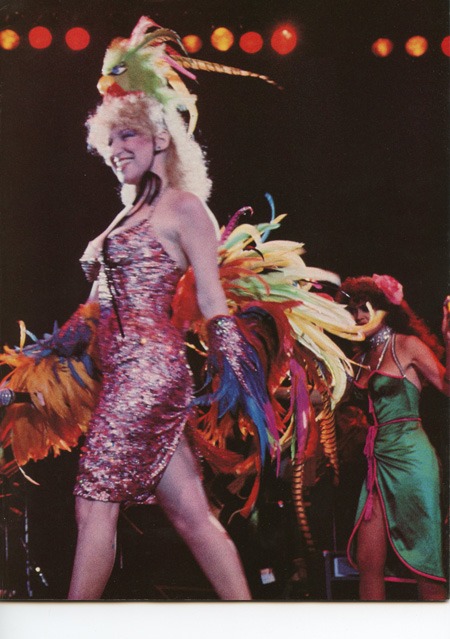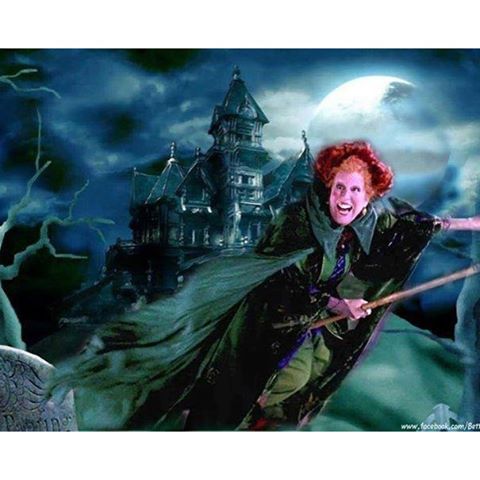Tuesday, October 17, 1978
THE STARS AND STRIPES
Bette Midler: Making A Splash In Europe
by Dave Warfield
AFTER HER difficult first night in Germany in Hamburg’s Congress Centrum Halle, Bette Midler spent a long time unwinding over dinner before she was ready for an interview. By the end of the night she had managed to win the hearts of the audience and the Hamburg critics – but only after stumbling badly a few times over the unfamiliar language barrier.
Her record company and promoter had discounted many of the already low-priced tickets, or given them away outright to fill the hall for the red-headed stranger to Germany. Only two nights later the word had gotten out and a few hundred people were disappointed to find her racy cabaret-style show sold out in Munich. That’s more like what she’s used to in America, where a Bette Midler show has been a scalper’s delight for several years.
“I’ve been doing shows like this since 1972,” she said. She talks in chopped-off sentences, not like a character in a book but like a character on the run; her thoughts sometimes seem to move faster than her tongue can convey them.
“I’ve been on the road for about two years. I did a show that was little like this in 1975 and 1976 for the Bicentennial – we took the show out. It was quite silly, it was very silly, and we had a wonderful time, and this show is a little bit like that show. It moves along and it’s not just a concert – it has two characters. So I guess since about 1976 – I did a show in New York called ‘Clams On The Half Shell’ and when that was over I took a couple of elements from that show and took it on the road. I’ve been going like that ever since then.”
Midler, who grew up in Hawaii and made her career in New York, has never worked outside of America before this tour, which began with a week at London’s Palladium. She got rave reviews in the British capital.
“We worked in Sweden four nights – unbelievable! Stockholm was like being in my living room. They understood everything – they got more jokes in Stockholm than they got in Seattle.
“When we were in Copenhagen we went all around the streets and I really, literally, thought we were gonna stiff in Denmark. The feeling on the street was very cold. You know, you go out on the street, sometimes they smile at you – people will smile at you and be very friendly – in Sweden they were very friendly and we did very well in Sweden. But when we came to Denmark we thought – when we went out on the streets they were really not warm, so I thought, ‘Oh, man, we’re gonna bite the dust,’ but we didn’t. We did OK. In fact it was one of the best shows-1 ever gave in my life. And they were great.”
Midler finished her first movie, The Rose, just before leaving for Europe, The film has been called the Cabaret of the 1960s, a tale of life in the show business world in the days of Woodstock and the Vietnam War. “We finished it about a month and a half ago – it’s a very strange little film. I didn’t see any of it. But I liked making it very much.
“I didn’t see a frame, not one frame. I didn’t have the nerve. I don’t think there’s a soul on this earth who has the nerve to see themselves blown up 20 feet high. It would make you quite nauseous wouldn’t it? It would certainly make me nauseous.”
Does she plan to shift her career into the movies full time if The Rose is a box o f f i ce success? “I’d like to be in the movies, yeah. Who in this life doesn’t want to be in the movies?
“It’s a silly dream, a very silly dream, but I indulge myself. I was brought up wi th the movies and I got sucked into that dream. I don’t know how I did it.”
Was that the idea all along? “No, really not.”
Midler has been portrayed as a woman with a single-minded ambition worthy of a Caesar, who has been aiming steadfastly for the top of the heap since childhood.
“I’ll tell you what it is,” she said. “I don’t think my pattern is di f f e r ent f rom hardly anybody in this life. I think that the pattern is the pattern, that you’re taught when you’re very young, that every human being is special, that every human being deserves recognition, that the most obvious kind of recognition is that recognition of being a movie star, just that approbation that tells you it’s all right that you existed, that you lived between this year and that year, and that – you know what I’m trying to say–that you were alive.”
Leaving your mark? “Exactly.”
Trying to be immortal? “Exactly. But it’s not so much the immortal, it’s not as pompous as being immortal. It’s just being alive and having people say, ‘I remember that so-and-so lived.’ Almost everything that I do is colored by that, and I don’t think I’m the only one. I think there’re millions of people just like me. I’m sure of it. It’s a kind of thinking that you can’t escape from. I don’t know who puts it out, I don’t know where it comes f rom, but I know it’s there.”
“Maybe it’s crazy and competitive of me, but I kept going and I came out at the other end, and I don’t know why. Certainly not because I’m any better. It’s just because I persevered, and I do believe that if you persevere and you allow your imagination a certain amount of freedom you will make your mark. And there’s room for everyone’s mark. I think there’s room for everybody. I mean everybody’s not gonna go out there and shake it. Cause some people are too embarrassed, you know what I mean?”








